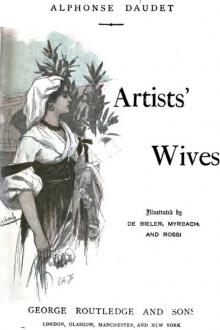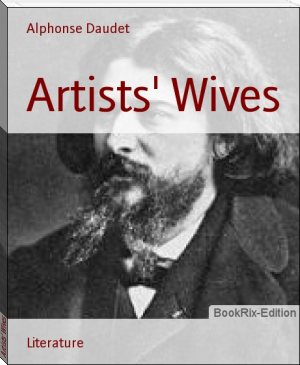Artists' Wives - Alphonse Daudet (the best e book reader .TXT) 📗

- Author: Alphonse Daudet
- Performer: -
Book online «Artists' Wives - Alphonse Daudet (the best e book reader .TXT) 📗». Author Alphonse Daudet
Poor creature! How I must have bored her! After having read her my verses, I explained them to her, seeking in her beautiful astonished eyes the hoped-for gleam of light, ever fancying I should surprise it.
I obliged her to give me her opinion and I passed over all that was foolish to retain only what a chance inspiration might contain of good. I so longed to make of her my true help mate, the real artist's wife! But no! She could not understand. In vain did I read to her the great poets, choosing the strongest, the tenderest,—the golden rhymes of the love poems fell upon her ear as coldly and tediously as a hailstorm. Once I remember, we were reading la Nuit d'Octobre; she interrupted me, to ask for something more serious! I tried then to explain to her that there is nothing in the world more serious than poetry, which is the very essence of life, floating above it like a glory of light, in the % vibrations of which words and thoughts are elevated and transfigured. Oh! what a disdainful smile passed over her pretty mouth and what condescension in her glance! As though a child or a madman had spoken to her.
What have I not thus wasted of strength and useless eloquence! Nothing was of any use. I stumbled perpetually against what she called good sense, reason, that eternal excuse of dried up hearts and narrow minds. And it was not only poetry that bored her. Before our marriage, I had believed her to be a musician. She seemed to understand the pieces she played, aided by the underlinings of her teacher. Scarcely was she married when she closed her piano, and gave up her music.
Can there be anything more melancholy than this abandonment by the young wife of all that had pleased in the young girl? The reply given, the part ended, the actress quits her costume. It was all done with a view to marriage; a surface of petty accomplishments, of pretty smiles, and fleeting elegance. With her the change was instantaneous. At first I hoped that the taste I could not give her, an artistic intelligence and love of the beautiful, would come to her in spite of herself, through the medium of this wonderful Paris, with its unconscious refining influence on eyes and mind. But what can be done with a woman who does not know how to open a book, to look at a picture, who is always bored and refuses to see anything? I soon understood that I must resign myself to have by my side nothing but a housewife, active and economical, indeed very economical. According to Proudhon, a woman, nothing more. I could have shaped my course accordingly; so many artists are in the same plight! But this modest rôle was not enough for her.
Little by little, slyly, silently, she managed to get rid of all my friends. We had not made any difference in our talk because of * her presence. We talked as we always had done in the past, but she never understood the irony or the fantasy of our artistic exaggerations, of our wild axioms, or paradoxes, in which-an idea is travestied only to figure more brilliantly. It only irritated and puzzled her. Seated in a quiet corner of the drawing-room, she listened and said nothing, planning all the while how she should eliminate one by one those who so much shocked her. Notwithstanding the seeming friendliness of the welcome, there could already be felt in my rooms that thin current of cold air, which warns that the door is open and that it is time to leave.
My friends once gone, she replaced them by her own. I found myself surrounded by an absurd set of worthies, strangers to art, who hated poetry and scorned it because "it made no money." On purpose the names of fashionable writers who manufacture plays and novels by the dozen were cited before me, with the remark: "So and so makes a great deal of money!"
Make money! this is the all-important point for these creatures, and I had the pain of seeing my wife think with them. In this fatal atmosphere, her provincial habits, her mean and narrow views were made still more odious by an incredible stinginess.
Fifteen thousand francs (six hundred pounds) a year! It seemed to me that with this income we could live without fear of the morrow. Not at all! She was always grumbling, talking of economy, reform, good investments. As she overpowered me with these dull details, I felt all desire and taste for work ebb away from me. Sometimes she came to my table and scornfully turned over the scattered half-written pages:—"Only that!" she would say, counting the hours lost upon the insignificant little lines. Ah I if I had listened to her, my glorious title of poet, which it has taken me so many years to win, would be now dragged through the black mire of sensational literature. And when I think that to this selfsame woman I had at first opened my heart, confided all my dreams; and when I think that the contempt she now shows me because I do not make money dates from the first days of our marriage; I am indeed ashamed, both of myself and of her.
I make no money! That explains everything, the reproach of her glance, her admiration for fruitful commonplaces, culminating in the steps she took but lately to obtain for me I don't know what post in a government office.
At this, however, I resisted. No defence remains to me but this, a force of inertia, which yields to no assault, to no persuasion. She may speak for hours, freeze me with her chilliest smile, my thought ever escapes her, will always escape her. And we have come to this! Married and condemned to live together, leagues of distance separate us; and we are both too weary, too utterly discouraged, to care to make one step that might draw us together. It is horrible!
ASSAULT WITH VIOLENCE.
MR. PETITBRY, Chamber Counsel.
To Madame Nina de B., at her Aunt's house, in Moulins.
Madame, conformably to the wishes of Madame your aunt, I have looked into the matter in question. I have noted down one by one all the different points and submitted your grievances to the most scrupulous investigation. Well, on my soul and conscience, I do not find the fruit ripe enough, or to speak plainly, I do not consider that you have sufficient grounds to justify your petition for a judicial separation. Let us not forget that the French law is a very downright kind of thing, totally devoid of delicate feeling for nice distinctions. It recognizes only acts, serious, brutal acts, and unfortunately it is these acts we lack. Most assuredly I have been deeply touched while reading the account of the first year of your married life, so very painful to you. You have paid dearly for the glory of marrying a famous artist, one of those men in whom fame and adulation develop monstrous egotism, and who under penalty of shattering the frail and timid life that would attach itself to theirs, must live alone. Ah! madame, since the commencement of my career, how many wretched wives have I not beheld in the same cruel position as yourself! Artists who live only by and for the public, carry nothing home to their hearth but fatigue from glory, or the melancholy of their disappointments. An ill-regulated existence, without compass or rudder, subversive ideas contrary to all social conventionality, contempt of family life and its happiness, cerebral excitement sought for in the abuse of tobacco and strong drink, without mentioning anything else, this constitutes the terrible artistic element from which your dear Aunt is desirous of withdrawing you; but I must repeat, that while I fully comprehend her anxiety, nay her remorse even at having consented to such a marriage, I cannot see that matters have reached a point calculated to warrant your petition.
I have, however, set down the outlines of a judicial memorandum, in which your principal grievances are grouped and skilfully brought into prominence. Here are the principal divisions of the work:
1°. Insulting conduct of Monsieur towards Madame's family.—Refusal to receive our Aunt from Moulins, who brought us up, and is tenderly attached to us.—Nicknames such as Tata Bobosse, Fairy Carabossa, and others, bestowed on that venerable old maid, whose back is slightly bent.—Jests and quips, drawings in pen and pencil of the aforesaid and her infirmity.
2°. Unsociableness.—Refusal to see Madame's friends, to make wedding calls, to send cards, to answer invitations, etc.
3°. Wanton extravagance.—Money lent without acknowledgment to all kinds of Bohemians.—Open house and free quarters, turning the house into an inn.—Constant subscriptions for statues, tombs, and productions of unfortunate fellow artists.—Starting an artistic and literary magazine!!!
4°. Insulting conduct to Madame.—Having said out loud when alluding to us: "What a fool!"
5°. Cruelty and violence.—Excessive brutality on the part of Monsieur.—Rage on the slightest pretext.—Breakage of china and furniture.—Scandalous rows, offensive expressions.
All this, as you see, dear Madame, constitutes a somewhat respectable amount of evidence, but is not however sufficient. We lack assault with violence. Ah! if we had only an assault with violence, a tiny little assault before witnesses, our case would be grand! But now that you have put a hundred and fifty miles between your husband and yourself we can scarcely hope for an incident of this kind. I say "hope" because in the present state of affairs, a brutal act on the part of this man would be the most fortunate thing that could befall you.
I remain, Madame, awaiting your commands, your devoted and obedient servant,
Petitbry.
PS.—Violence before witnesses, of course!
To Monsieur Petitbry, in Paris.
What, Sir! have we come to such a pass as this! Is this what your laws have made of antique French chivalry! So then, when a misunderstanding is often sufficient to separate two hearts for ever, your law courts require acts of violence to justify such a separation. Is it not scandalous, unjust, barbarous, outrageous? To think that in order to regain her freedom, my poor darling will be obliged to run her neck into the halter, to abandon herself to all the fury of that monster, to excite it even. But no matter, our mind is made up. An assault with personal violence is necessary. Well! we will have it. No later than to-morrow, Nina will return to Paris, How will she be received? What will take place there? I cannot think of it without a shudder. At this idea my hand trembles, my eyes become dimmed. Ah! Monsieur. Ah! Monsieur Petitbry. Ah!
Nina's unhappy Aunt.
MR. MARESTANG, ATTORNEY At the Law Court of the Seine.
To Monsieur Henri de B., Literary man in Paris.
Be calm, be calm, be calm! I forbid your going to Moulins or rushing off in pursuit of the fugitive. It is more judicious and safer to await her return in your own house, by your fireside. In point of fact, what has taken place? You refused to receive that ridiculous and ill-natured old maid; your wife has gone to join her. You should have expected





Comments (0)